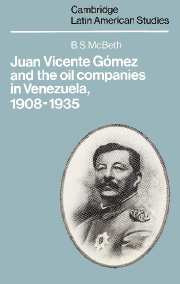Book contents
- Frontmatter
- Contents
- List of tables and map
- Preface
- List of abbreviations
- Introduction
- 1 The dawning of an era
- 2 The legal framework
- 3 Oil companies and finance
- 4 National and local effects of the oil industry
- 5 Greater control of the oil industry
- Conclusion
- Appendix
- Notes
- Bibliography
- Index
- CAMBRIDGE LATIN AMERICAN STUDIES
5 - Greater control of the oil industry
Published online by Cambridge University Press: 22 September 2009
- Frontmatter
- Contents
- List of tables and map
- Preface
- List of abbreviations
- Introduction
- 1 The dawning of an era
- 2 The legal framework
- 3 Oil companies and finance
- 4 National and local effects of the oil industry
- 5 Greater control of the oil industry
- Conclusion
- Appendix
- Notes
- Bibliography
- Index
- CAMBRIDGE LATIN AMERICAN STUDIES
Summary
The rapid development of the oil industry after 1922 surprised most observers; it also posed a difficult problem for the government, which aspired to maintain control and supervision of the industry. Proper legislation covering all aspects of its activities would inevitably lag behind; furthermore, there was little point in repeating the errors of 1920 and 1921, when legislation was hastily drafted and ambiguous, as this would lead to disputes and to a possible curtailment of the companies' activities. In addition, though the country had experienced a lesser mining boom in the latter half of the nineteenth century, Gómez's government was handicapped by a dearth of qualified and honest personnel at all levels. The oil companies were able at first to act with impunity in the oil districts. In many cases they were able to act in this manner because no laws existed under which they could be controlled or their activities prosecuted. An example of this was the pollution of Lake Maracaibo. The treatment of oil workers was another area in which there was scant legislation. During these early days the government also exercised very little supervision of the exact amount of oil produced by the companies, although the companies' output determined the amount of oil revenues received by the government. Up to the enactment of the 1930 Oil Regulations, the government accepted the companies' own production figures as true, ignoring the obvious temptation that such a situation gave to the companies to adjust their figures before submitting them.
- Type
- Chapter
- Information
- Juan Vicente Gómez and the Oil Companies in Venezuela, 1908–1935 , pp. 159 - 212Publisher: Cambridge University PressPrint publication year: 1983



